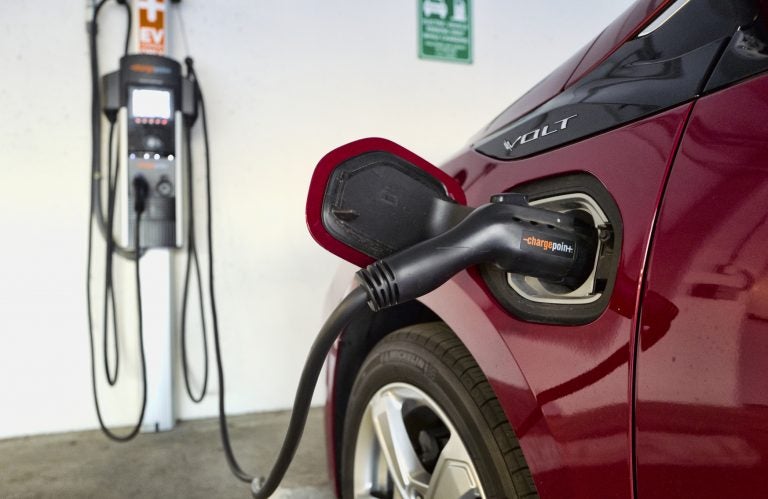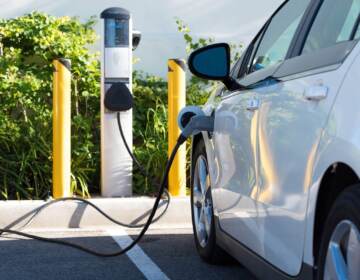N.J. launches $5,000 rebate for electric vehicles purchases
It’s part of a push to increase electric vehicles on New Jersey’s roads tenfold by 2025.

(Richard Vogel/AP Photo, file)
New Jersey drivers who have purchased or leased an electric car on or since Jan. 17 can get up to $5,000 back, Gov. Phil Murphy announced this week. The rebate is part of a push to increase plug-in vehicles on the state’s roads tenfold by 2025.
The offer now makes the Garden State one of the most favorable places in the nation to buy or lease an electric vehicle. Some of the cheapest models now have a sticker price of $30,000 to $40,000.
“This is New Jersey really getting out in front of other states in the region,” said Daniel Gatti, a transportation analyst at the nonpartisan Union for Concerned Scientists. “New Jersey’s rebate is about two-and-a half-times larger than either Pennsylvania or New York.”
The state already waives its 6.625% sales tax for such purchases, and the federal government offers an income tax credit of up to $7,500 based on battery capacity and model.
To ease “range anxiety,” New Jersey has also launched a program to install hundreds more charging stations throughout the state, doubling the number of places motorists can go to recharge their vehicles.
Separately, the state may soon offer up to $500 back to people who install charging equipment in their home.
“That’s enough to offset most of the cost of installing a home charger,” Gatti said.
The new rebate is funded by about $30 million annually from an existing “societal benefits charge” that appears on ratepayers’ utility bills and proceeds from New Jersey’s membership in a regional cap-and-trade program.
It applies to vehicles with a retail price below $55,000 and provides $25 for each mile the car runs on electric power instead of gas, up to the $5,000 cap.
That means cars with 200 miles of electric range or more — such as those offered by Tesla, Chevrolet, Nissan and several other carmakers — would qualify for the maximum amount.
Plug-in hybrid cars are also eligible for the rebate through 2022, although with a median range of 21 miles, buyers would get only about $525 back.
Loren McDonald, who runs the data-rich website EVAdoption.com, said it was a mistake by lawmakers to essentially penalize those types of cars, which include forthcoming Toyota RAV4 and Ford Escape models.
“What we really want is more people in New Jersey driving lower-emission vehicles,” he said. “In this case, they’ve favored one type over another.”
The Murphy administration has set a goal of shifting the state to 100% clean energy by mid-century. Besides weaning New Jersey off of its heavy reliance on natural gas for heating homes and generating electricity, a huge challenge is “electrifying” a transportation sector that currently accounts for more than 40% of carbon emissions in the state.
The governor said that’s key to fighting climate change and air pollution, which tends to disproportionately affect communities of color.
New Jersey consistently ranks as having some of the most polluted air quality in the nation, according to annual reports by the American Lung Association.
McDonald said promoting electric vehicles will be a big part of hitting zero-emission targets, but it won’t be a “silver bullet.”
“What has to go hand-in-hand with this is a lot of other policies, like getting people out of cars and onto mass transit and building housing closer to the transit,” he said. “And obviously cleaning up the grid that’s powering these cars.”
Through 2018, New Jersey had roughly 26,000 electric vehicles on its roads, according to EVAdoption.com. That was the seventh-highest number nationally. California had the most with more than 500,000.
The Murphy administration wants 330,000 fully electric or plug-in hybrid vehicles zipping around the state by the end of 2025. That goal was included in the bill he signed last month, S-2252, which created the rebate program and codified several other incentives to accelerate electric vehicle adoption.
The measure also calls for New Jersey Transit to be purchasing zero-emission buses exclusively by the end of 2032.
Last year, the state announced it would use $3.2 million from its share of the Volkswagen emissions cheating settlement to install 827 charging outlets at 533 locations, more than doubling the number of non-residential outlets in the state.
Previously, New Jersey had the worst electric-vehicle-to-charging-outlet ratio in the country, according to EVAdoption.com.
WHYY is your source for fact-based, in-depth journalism and information. As a nonprofit organization, we rely on financial support from readers like you. Please give today.





